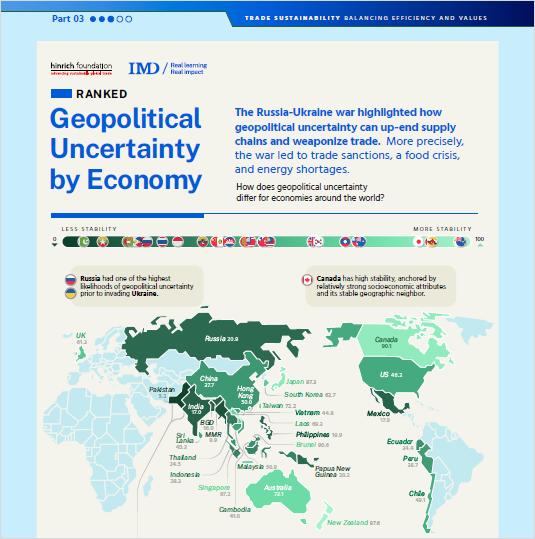Published 07 February 2023
Global trade creates greater interdependence through mutually reinforcing economic growth and development. However, increasing global geopolitical uncertainty is weighing on the broad economic outlook and international trade relationships. We asked data artists Visual Capitalist to capture the varying levels of geopolitical uncertainties among economies, part of the indicators measured in the Hinrich-IMD Sustainable Trade Index 2022.
(Text by Tavis Tan)
Russia’s invasion of Ukraine up-ended supply chains, triggered food shortages, and turned trade itself into a weapon of war. It underscores how geopolitical uncertainty increasingly dictates the outcomes of sustainable trade.
In peacetime, trade is an expression of the trust across national borders, formed through collaboration and mutually beneficial agreements that bring certainty and stability to international relations. The rules-based multilateral trading system serves to minimize risk and volatility through shared principles, frameworks for dispute settlement, and mechanisms to ensure healthy competition.
However, turbulence in geopolitics rattles this foundation, disrupts trade, and in some instances, cascades into protectionism and civil unrest.
Geopolitics is fundamental to macroeconomics, and trade has historically been weaponized amidst high geopolitical tension. In the 1930s, Italy faced an extensive number of sanctions including a ban of all imports from Italy for its invasion of Ethiopia. Today, a similar response is seen against Russia’s invasion of Ukraine. The Russia-Ukraine war led to trade sanctions, a food crisis, and energy shortages around the world as borders shut and the flow of goods halted. Similarly, the US-China trade war resulted in harmful tariffs and global instability.
Geography matters. Take Pakistan and India. Both ranked lowly in political stability at 5.2 and 17 on a scale of 100 respectively in our index. The two countries have high geopolitical uncertainty in part due to border tensions, with studies showing the instability has negatively impacted exports from Pakistan.
Contrastingly, Canada ranked highly at 90.1, anchored by strong socioeconomic attributes and a stable geographic neighborhood. Countries that score well on this count, such as New Zealand, Singapore, and Brunei, share common characteristics: political stability, low rates of civil violence, and absence of terrorism.
The data artists Visual Capitalist illustrate how 30 key trading economies around the world fare in fostering political stability and eliminating violence, based on data provided by the Hinrich Foundation’s Sustainable Trade Index.
Policymakers and businesses around the world should brace for greater global economic uncertainty as geopolitical uncertainty looms.
This infographic is part of the Hinrich-IMD Sustainable Trade Index 2022. The Sustainable Trade Index is currently in its fourth edition.
© The Hinrich Foundation. See our website Terms and conditions for our copyright and reprint policy. All statements of fact and the views, conclusions and recommendations expressed in this publication are the sole responsibility of the author(s).







